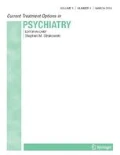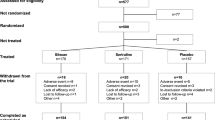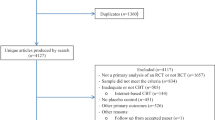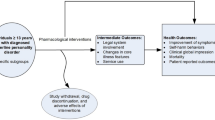Opinion statement
Cognitive impairment is a key feature of bipolar disorder (BD) which often persists into euthymia. This impairment appears to be independent, to an extent, of mood symptoms and is associated with deficits in overall functioning. Priority should thus be given to research investigating adjunctive treatments aimed at improving cognitive functioning in BD. This paper systematically reviews studies specifically examining changes in cognitive functioning in relation to pharmacological and/or psychosocial interventions in adults with BD. Eighteen studies were included in the review: 11 examining pharmacological interventions and seven examining psychosocial interventions. Findings from the reviewed studies were mixed but generally did not produce evidence of widespread cognitive improvement at treatment end in line with widespread cognitive impairment considered to be a key feature of BD. It is, however, difficult to draw conclusions from the research to date due to the general scarcity of studies in the area, small sample sizes, minimal replication of studies examining the same intervention and variability in study designs. Future research in the area would benefit greatly from investigating the current reviewed interventions in large-scale RCTs. An understanding of what particular subgroups of BD patients gain most benefit from cognitive interventions would be of clinical use.
Similar content being viewed by others
References and Recommended Reading
Papers of particular interest, published recently, have been highlighted as: • Of importance •• Of major importance
American Psychiatric Association, Diagnostics and Statistical Manual of Mental Disorders. 5th ed. 2013, Washington: APA.
World Health Organization. International statistical classification of diseases and related health problems, 10th revision. Geneva: WHO; 1992.
Andreou C, Bozikas VP. The predictive significance of neurocognitive factors for functional outcome in bipolar disorder. Curr Opin Psychiatry. 2013;26(1):54–9.
Van Rheenen TE, Rossell SL. An investigation of the component processes involved in verbal declarative memory function in bipolar disorder; utility of the Hopkins Verbal Learning Test-Revised. J Int Neuropsychol Soc. 2014;20:1–9.
Van Rheenen TE, Rossell SL. Genetic and neurocognitive foundations of emotion abnormalities in bipolar disorder. Cogn Neuropsychiatry. 2013;18(3):168–207.
Van Rheenen TE, Rossell SL. An empirical evaluation of the MATRICS consensus cognitive battery in bipolar disorder. Bipolar Disord. 2014;16:318–25.
Porter RJ et al. The neurocognitive profile of mood disorders—a review of the evidence and methodological issues. Bipolar Disord. 2015;17:21–40.
Bora E, Pantelis C. Meta-analysis of cognitive impairment in first-episode bipolar disorder: comparison with first-episode schizophrenia and healthy controls. Schizophrenia Bull. 2016.
Robinson LJ et al. A meta-analysis of cognitive deficits in euthymic patients with bipolar disorder. J Affect Disord. 2006;93:105–15.
Bora E et al. Meta-analytic review of neurocognition in bipolar II disorder. Acta Psychiatr Scand. 2011;123(3):165–74.
Bora E, Yucel M, Pantelis C. Cognitive endophenotypes of bipolar disorder: a meta-analysis of neuropsychological deficits in euthymic patients and their first-degree relatives. J Affect Disord. 2009;113:1–20.
Balanzá-Martínez V et al. Neurocognitive endophenotypes (endophenocognitypes) from studies of relatives of bipolar disorder subjects: a systematic review. Neurosci Biobehav Rev. 2008;32:1426–38.
Martino DJ et al. Neurocognitive functioning in the premorbid stage and in the first episode of bipolar disorder: a systematic review. Psychiatry Res. 2015;226:23–30.
Van Rheenen TE, Meyer D, Rossell SL. Pathways between neurocognition, social cognition and emotion regulation in bipolar disorder. Acta Psychiatr Scand. 2014;30(5):397–405.
Martino DJ et al. Theory of mind and facial emotion recognition in euthymic bipolar I and bipolar II disorders. Psychiatry Res. 2011;189(3):379–84.
Van Rheenen T, Rossell S. Facial emotion recognition impairments in bipolar disorder. A cognitive problem? J Int Neuropsychol Soc. 2016;22:583–5.
Bourne C et al. Neuropsychological testing of cognitive impairment in euthymic bipolar disorder: an individual patient data meta-analysis. Acta Psychiatr Scand. 2013;128(3):149–62.
Sanchez-Moreno J et al. Functioning and disability in bipolar disorder: an extensive review. Psychother Psychosom. 2009;78(5):285–97.
Harvey PD et al. Cognition and disability in bipolar disorder: lessons from schizophrenia research. Bipolar Disord. 2010;12(4):364–75.
Access Economics: Sane Australia, Bipolar disorders: Costs, SANE, Editor. 2003: Melbourne, Australia.
Van Rheenen TE, Rossell SL. Objective and subjective psychosocial functioning in bipolar disorder: an investigation of the relative importance of neurocognition, social cognition and emotion regulation. J Affect Disord. 2014;162:134–41.
Allen DN, Bello DT, Thaler NS. Neurocognitive predictors of performance-based functional capacity in bipolar disorder. J Neuropsychol. 2014;9:159–71.
Baune BT, Malhi GS. A review on the impact of cognitive dysfunction on social, occupational, and general functional outcomes in bipolar disorder. Bipolar Disord. 2015;17 Suppl 2:41–55.
Burdick KE, Goldberg JF, Harrow M. Neurocognitive dysfunction and psychosocial outcome in patients with bipolar I disorder at 15-year follow-up. Acta Psychiatr Scand. 2010;122(6):499–506.
Tabarés-Seisdedos R et al. Neurocognitive and clinical predictors of functional outcome in patients with schizophrenia and bipolar I disorder at one-year follow-up. J Affect Disord. 2008;109(3):286–99.
Jaeger J et al. Neurocognitive test performance predicts functional recovery from acute exacerbation leading to hospitalization in bipolar disorder. Bipolar Disord. 2007;9:93–102.
Torres IJ et al. Relationship between cognitive functioning and 6-month clinical and functional outcome in patients with first manic episode bipolar I disorder. Psychol Med. 2011;41(05):971–82.
Martino DJ et al. Neurocognitive and symptomatic predictors of functional outcome in bipolar disorders: a prospective 1 year follow-up study. J Affect Disord. 2009;116(1):37–42.
Tohen M et al. Two-year syndromal and functional recovery in 219 cases of first-episode major affective disorder with psychotic features. Am J Psychiatry. 2000;157(2):220–8.
Coryell W et al. The enduring psychosocial consequences of mania and depression. Am J Psychiatry. 1993;150:720–7.
Porter RJ et al. Cognitive remediation as a treatment for major depression: a rationale, review of evidence and recommendations for future research. Aust N Z J Psychiatry. 2013;47(12):1165–75.
Connolly KR, Thase ME. The clinical management of bipolar disorder: a review of evidence-based guidelines. Prim Care Companion CNS Disord. 2011;13(4):PCC.10r01097.
Higgins JPT, Green S, editors. Cochrane handbook for systematic reviews of interventions. Version 5.1.0 ed. 2011, The Cochrane Collaboration: http://www.cochrane-handbook.org.
Sole B et al. Functional remediation for patients with bipolar II disorder: improvement of functioning and subsyndromal symptoms. Eur Neuropsychopharmacol. 2015;25(2):257–64.
Bonnin CM et al. Effects of functional remediation on neurocognitively impaired bipolar patients: enhancement of verbal memory. Psychol Med. 2016;46(2):291–301.
Spaulding WD et al. Effects of cognitive treatment in psychiatric rehabilitation. Schizophr Bull. 1999;25(4):657–76.
McGurk SR, Mueser KT, Pascaris A. Cognitive training and supported employment for persons with severe mental illness: one-year results from a randomized controlled trial. Schizophr Bull. 2005;31(4):898–909.
Choi J, Medalia A. Factors associated with a positive response to cognitive remediation in a community psychiatric sample. Psychiatr Serv. 2005;56(5):602–4.
Zyto S et al. A pilot study of a combined group and individual functional remediation program for patients with bipolar I disorder. J Affect Disord. 2016;194:9–15.
Meusel LA et al. Neural correlates of cognitive remediation in patients with mood disorders. Psychiatry Res. 2013;214(2):142–52.
Naismith SL et al. Cognitive training in affective disorders improves memory: a preliminary study using the NEAR approach. J Affect Disord. 2010;121(3):258–62.
Porter RJ et al. No change in neuropsychological dysfunction or emotional processing during treatment of major depression with cognitive-behaviour therapy or schema therapy. Psychol Med. 2016;46(2):393–404.
Young AH et al. Improvements in neurocognitive function and mood following adjunctive treatment with mifepristone (RU-486) in bipolar disorder. Neuropsychopharmacol: Off Publ Am Coll Neuropsychopharmacol. 2004;29(8):1538–45.
Ghaemi SN et al. A double-blind, placebo-controlled pilot study of galantamine to improve cognitive dysfunction in minimally symptomatic bipolar disorder. J Clin Psychopharmacol. 2009;29(3):291–5.
Burdick KE et al. Placebo-controlled adjunctive trial of pramipexole in patients with bipolar disorder: targeting cognitive dysfunction. J Clin Psychiatry. 2012;73(1):103–12.
Dean OM et al. Effects of N-acetyl cysteine on cognitive function in bipolar disorder. Psychiatry Clin Neurosci. 2012;66(6):514–7.
McIntyre RS et al. A randomized, double-blind, controlled trial evaluating the effect of intranasal insulin on neurocognitive function in euthymic patients with bipolar disorder. Bipolar Disord. 2012;14(7):697–706.
Watson S et al. A randomized trial to examine the effect of mifepristone on neuropsychological performance and mood in patients with bipolar depression. Biol Psychiatry. 2012;72(11):943–9.
Chengappa K et al. Randomized placebo-controlled adjunctive study of an extract of Withania somnifera for cognitive dysfunction in bipolar disorder. J Clin Psychiatry. 2013;74(11):1076–83.
Burdick KE et al. Dopaminergic influences on emotional decision making in euthymic bipolar patients. Neuropsychopharmacology. 2014;39(2):274–82.
Miskowiak KW et al. Recombinant human erythropoietin to target cognitive dysfunction in bipolar disorder: a double-blind, randomized, placebo-controlled phase 2 trial. J Clin Psychiatry. 2014;75(12):1347–55.
Torrent C et al. Efficacy of functional remediation in bipolar disorder: a multicenter randomized controlled study. Am J Psychiatry. 2013;170(8):852–9.
Demant KM et al. Effects of short-term cognitive remediation on cognitive dysfunction in partially or fully remitted individuals with bipolar disorder: results of a randomised controlled trial. PLoS ONE. 2015;10(6), e0127955.
Bonnin CM et al. Functional remediation in bipolar disorder: 1-year follow-up of neurocognitive and functional outcome. Br J Psychiatry. 2016;208(1):87–93. This paper reports 1-year follow-up cognitive and functional outcomes from the largest RCT of a functional remediation intervention conducted in a BD sample to date.
Gildengers AG et al. A 12-week open-label pilot study of donepezil for cognitive functioning and instrumental activities of daily living in late-life bipolar disorder. Int J Geriatric Psychiatry. 2008;23(7):693–8. 6p.
Iosifescu DV et al. Galantamine-ER for cognitive dysfunction in bipolar disorder and correlation with hippocampal neuronal viability: a proof-of-concept study. CNS Neurosci Ther. 2009;15(4):309–19.
Deckersbach T et al. Research: Cognitive rehabilitation for bipolar disorder: an open trial for employed patients with residual depressive symptoms. CNS Neurosci Ther. 2010;16(5):298–307.
Lahera G et al. Social cognition and interaction training (SCIT) for outpatients with bipolar disorder. J Affect Disord. 2013;146(1):132–6. This paper describes the first study in a BD sample to examine the cognitive and functional effects of an intervention specifically targeting social cognition.
Docteur A et al. The role of CBT in explicit memory bias in bipolar I patients. J Behav Ther Exp Psychiatry. 2013;44(3):307–11.
Chang Y-S et al. Parallel improvement of cognitive functions and p300 latency following donepezil treatment in patients with Alzheimer’s disease: a case–control study. J Clin Neurophysiol. 2014;31(1):81–5. 5p.
Young-Chul C et al. Effect of donepezil added to atypical antipsychotics on cognition in patients with schizophrenia: an open-label trial. World J Biol Psychiatry. 2009;10(2):156–62.
Farlow MR et al. Effectiveness and tolerability of high-dose (23 mg/d) versus standard-dose (10 mg/d) donepezil in moderate to severe Alzheimer’s disease: a 24-week, randomized, double-blind study. Clin Ther. 2010;32(7):1234–51. 18p.
Reger M et al. Effects of intranasal insulin on cognition in memory-impaired older adults: modulation by APOE genotype. Neurobiol Aging. 2006;27(3):451–8.
Martino DJ et al. Heterogeneity in cognitive functioning among patients with bipolar disorder. J Affect Disord. 2008;109(1):149–56.
Lewandowski KE et al. Cognitive variability in psychotic disorders: a cross-diagnostic cluster analysis. Psychol Med. 2014;44(15):3239–48.
Burdick KE et al. Assessing cognitive function in bipolar disorder: challenges and recommendations for clinical trial design. J Clin Psychiatry. 2015;76(3):e342–50. This paper provides consensus recommendations as a preliminary guide for future cognitive treatment trial design.
Sweeney JA, Kmiec JA, Kupfer DJ. Neuropsychologic impairments in bipolar and unipolar mood disorders on the CANTAB neurocognitive battery. Biol Psychiatry. 2000;48(7):674–84.
Taylor Tavares JV et al. Distinct profiles of neurocognitive function in unmedicated unipolar depression and bipolar II depression. Biol Psychiatry. 2007;62(8):917–24.
Xu G et al. Neuropsychological performance in bipolar I, bipolar II and unipolar depression patients: a longitudinal, naturalistic study. J Affect Disord. 2012;136(3):328–39.
Bourke C, Douglas KM, Porter RJ. Processing of facial emotion processing in depression—a review. Aust N Z J Psychiatry. 2010;44:681–96.
Van Rheenen TE, Rossell SL. Is the non-verbal behavioural emotion-processing profile of bipolar disorder impaired? A critical review. Acta Psychiatr Scand. 2013;128(3):163–78.
Mercer L, Becerra R. A unique emotional processing profile of euthymic bipolar disorder? A critical review. J Affect Disord. 2013;146(3):295–309.
Van Rheenen TE, Rossell SL. Let’s face it: facial emotion processing is impaired in bipolar disorder. J Int Neuropsychol Soc. 2014;20(02):200–8.
Van Rheenen TE, Rossell SL. Picture sequencing task performance indicates theory of mind deficit in bipolar disorder. J Affect Disord. 2013;151(3):1132–4.
Douglas KM, Porter RJ. Impaired recognition of disgusted facial expressions in severe depression. Br J Psychiatry. 2010;197:156–7.
Kurtz MM et al. Comprehensive treatments for social cognitive deficits in schizophrenia: a critical review and effect-size analysis of controlled studies. Clin Psychol Rev. 2016;43:80–9.
Acknowledgments
The authors would like to thank Professor Marie Crowe for her support in systematic review procedures. Dr. Van Rheenen would like to thank the NHMRC for financial support of her research through salary funding.
Author information
Authors and Affiliations
Corresponding author
Ethics declarations
Conflict of Interest
Dr. Van Rheenen is currently supported by an NHMRC Early Career Fellowship and receives funding from the Rebecca L Cooper Foundation, the Barbara Dicker Brain Sciences Foundation and the University of Melbourne.
Dr. Katie Douglas declares she has no conflict of interest.
Human and Animal Rights and Informed Consent
This article does not contain any studies with human or animal subjects performed by any of the authors.
Additional information
This article is part of the Topical Collection on Mood Disorders
Rights and permissions
About this article
Cite this article
Douglas, K.M., Van Rheenen, T.E. Current Treatment Options for Cognitive Impairment in Bipolar Disorder: a Review. Curr Treat Options Psych 3, 330–355 (2016). https://doi.org/10.1007/s40501-016-0092-7
Published:
Issue Date:
DOI: https://doi.org/10.1007/s40501-016-0092-7




